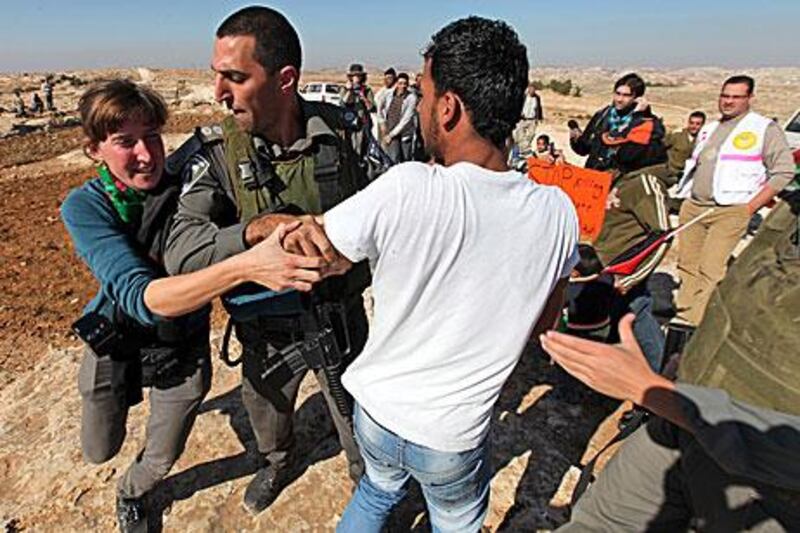TEL AVIV // Israel's biggest civil rights group yesterday blasted the country for curbing the freedom of speech and freedom of assembly for Jews and Palestinians in the occupied West Bank.
A report by the Association for Civil Rights in Israel (ACRI) said the country was stepping up action to stifle dissent.
It claimed the government has warned political activists not to participate in protests and allowed local authorities to repress demonstrations.
The report comes almost three years after the hardline government of the prime minister, Benjamin Netanyahu, took power, and documents a right-wing shift in governmental and security-related policies.
ACRI contends that security forces acted illegally and undemocratically during the social and economic protests that took place last summer across Israel.
Those demonstrations, the largest rallies focusing on social and economic policies in Israel's 63-year history, condemned the high cost of living and lambasted government policies on housing, education and consumer prices.
Many police officers, required by law to don identification tags when on duty, confronted the protesters after intentionally removing their tags, according to ACRI.
Some officers operated with their faces masked, while others wore civilian clothes and refused to identify themselves as police when asked by protesters to show their tags.
The group said masked police have also dispersed demonstrations against Jewish settlers in East Jerusalem's Sheikh Jarrah neighbourhood and distributed evacuation orders to Palestinians in Jerusalem's Silwan neighbourhood.
They are also accused of participating in the state's house demolitions at the Bedouin village of Al-Arakib.
The report also criticised the authorities for trying to repress the protests, which lasted several months and featured dozens of tent cities in Israeli cities.
ACRI said it received many complaints, including attempts by officials to evacuate or dismantle the tents, confiscate activists' belongings, take down protest signs and issue fines.
ACRI said Israel has stepped up moves to dissuade political activists from taking part in demonstrations, many of them against Israeli policies towards the country's Palestinian citizens or towards Palestinians living in the West Bank.
The Shin Bet internal security service has become known for collecting information about political activists and summoning some of them for questioning aimed at intimidating them from taking part in protests, ACRI said.
The trend towards right-wing policies is perhaps best reflected in the country's parliament, where the Right holds a majority and which in the past two years has witnessed a wave of legislation targeting Israeli Arabs and human rights groups.
ACRI said the "anti-democratic legislation has been worsening and is mostly aimed at hurting the basic rights that form the foundations of a democracy".
Hillary Clinton, the US secretary of state, said over the weekend she was concerned about a "wave of anti-democratic legislation" in Israel, such as a bill proposing a limit to foreign donations to human rights groups. Her comments, made behind closed doors at a conference in Washington, made headlines in Israel and spurred anger among some right-wing ministers.
The finance minister, Yuval Steinitz, called the statements "totally exaggerated" and claimed Israel was a "living, breathing liberal democracy", while the environment minister, Gilad Erdan, suggested that Mrs Clinton should direct her attention to US problems.
Controversial laws passed during the current parliamentary term include a ban against a boycott of Jewish settlements in the West Bank and a measure enabling the denial of state funding to institutions that question the country's existence as a Jewish state, a law viewed as targeting the Arab minority.
The group also criticised Israel for policies in the West Bank that discriminate against Palestinians, such as detaining them for longer periods than Jews who have been arrested or denying them access to a lawyer.





